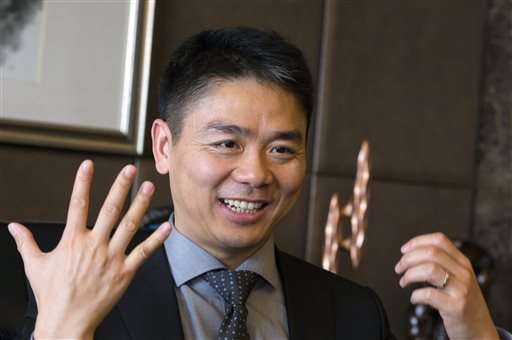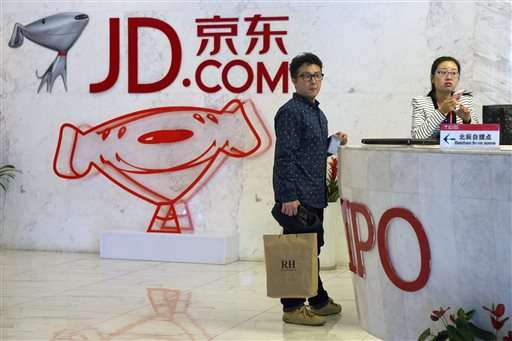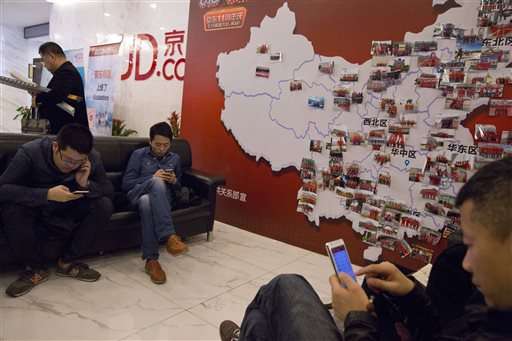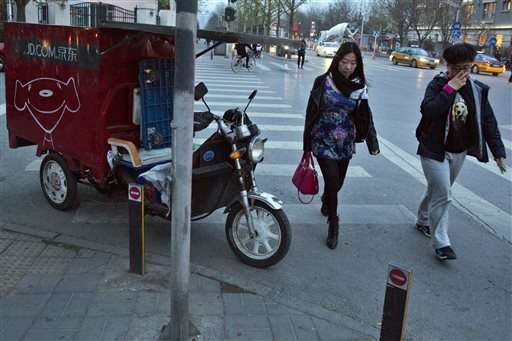In land of fakes, Chinese e-commerce giant sells trust

Before he became a billionaire in e-commerce, Richard Liu was a failure.
As a student, Liu started a restaurant in Beijing but went bankrupt. He blames employees who he said stole from him, and when he took a second stab at business by opening an electronics store in 1998, Liu insisted on honesty. After seeing other shops overcharge customers and pass off counterfeit goods, he says he sold only genuine merchandise.
"I felt this was an opportunity to establish a new kind of business," said Liu in an interview. He said his shop became the first in northwestern Beijing's Zhongguancun neighborhood, a center for technology companies, to use price tags to avoid haggling with buyers.
After Liu went online in 2003 and expanded into selling home appliances, clothing and other goods, that focus on reliability helped his company, JD.com, grow into China's biggest Internet-based direct retailer. It is a powerful selling point for Chinese consumers who have endured repeated scandals over fake and sometimes deadly milk, medicines and other products.
In contrast to China's dominant e-commerce brand, Alibaba Group, which provides platforms for companies and consumers to sell directly to each other and leaves the handling of goods to outside delivery companies, JD.com operates like a department store, buying goods from suppliers and re-selling them to shoppers. The Beijing-based company controls the flow of merchandise from the supplier to the customer's door. It operates its own distribution network of more than 100 warehouses and a fleet of thousands of bright red delivery vehicles emblazoned with its logo of a grinning dog named Joy.
Liu, 41, said his disastrous experience operating a restaurant while studying at People's University in Beijing in the mid-1990s taught him a painful lesson about the role of honesty in business. He said pilfering and phony receipts were common.
"An employee would pay 2 yuan for bean sprouts but tell me he paid 4 yuan," said Liu, whose name in Chinese is Liu Qiangdong. "The cashier and other employees would sneak money into their own pockets."
Liu is part of a wave of Chinese business leaders in fields from e-commerce to tourism and mobile phones who are helping to drive the rapid evolution of the world's second-largest economy.
Most prominent is Alibaba founder Jack Ma, who became a media star in the West after a record-setting $25 billion U.S. stock offering last year. Another is Wang Jianlin, chairman of Wanda Group, which acquired U.S. cinema chain AMC in 2012.
China accounted for 213 billionaires on Forbes magazine's global rich list last year, more than any other country except the United States with 536. And while many of the Americans inherited their riches, nearly all the Chinese are self-made. And young, too: JD.com's Liu and some others passed $1 billion in net worth before turning 40.
JD.com has emerged as Alibaba's strongest challenger in a Chinese e-commerce market that consulting firm Forrester says could grow to $1 trillion in annual sales by 2020.
Its rise reflects the rapid emergence of more affluent and demanding Chinese consumers. Online shoppers used to look only at price and took their chances with counterfeit or shoddy goods. Today, they are willing to pay for quality and are shifting to merchants that control their supply chain and will help resolve complaints.

Last year, JD.com raised its profile abroad with a U.S. stock market debut that raised $1.8 billion ahead of Alibaba's IPO. Liu's net worth has risen to $8.8 billion.
JD.com's workforce of 68,000 includes inspectors who check product quality. A call center with a staff of 7,000 fields customer complaints. The company also operates an online mall with about 60,000 merchants that include clothing brands Uniqlo and The Gap. It screens sellers before they are allowed onto the site and those caught dealing in counterfeits can be fined 1 million yuan ($160,000).
Liu keeps a lower public profile than Alibaba's Ma.
Each June, Liu marks the anniversary of JD.com's founding by working for a day as a delivery driver. Chinese news reports say customers often fail to recognize him when he shows up at their door.
In person, Liu exudes quiet confidence rather than the exuberant energy of many Chinese entrepreneurs his age. He has a personable manner and boyish face but an older man's unwavering gaze. During an interview in his wood-paneled office in a tower adjacent to the site of the 2008 Beijing Olympics, he chuckled at a question about how he chose Joy the dog as JD.com's mascot.
"Don't you think it's cute?" he said. The logo, he said, symbolizes JD.com's loyalty to customers and is meant to make a company founded on selling to male tech nerds more welcoming to female shoppers.
JD.com is a fraction of Alibaba's size but growing faster.
The total value of goods sold across Alibaba's platforms in the first quarter of this year was more than six times JD.com's level of 87.8 billion yuan ($14.2 billion). But JD.com sales rose 99 percent, more than double Alibaba's 40 percent growth.
For its part, Alibaba has responded to pressure to help stamp out China's rampant trade in fakes by increasing spending and assigning more than 2,000 employees to keeping counterfeits off its sales platforms.

Other Chinese online retailers need to set up similar distribution and quality control systems if they want to get out of the "no-win game" of competing on price alone, said Angela Wang, an expert in retailing at the Boston Consulting Group.
Liu moved online after the outbreak of severe acute respiratory syndrome in 2003 kept shoppers away from stores, sending Chinese retailing into a tailspin. As it grew, the company was renamed 360buy Jingdong Inc. and became JD.com in January 2014.
JD.com has yet to report a profit but says its loss narrowed to 710.2 million yuan ($114.6 million) in the first quarter, equal to about 1.9 percent of revenue.
Its network is being expanded into the populous Chinese countryside.
"By the end of this year, we will be ready to enter nearly 100,000 villages," said Liu. "A logistics network covering the whole country will have been completely built."

And JD.com is extending its model abroad.
In February, it launched a French Mall that allows Chinese customers to order wine, cosmetics and clothing directly from France. It launched a Korean Mall in March and Liu says it plans similar direct sales links to suppliers in the United States, Australia, Italy and Spain.

The company plans one day to sell in other markets, Liu said.
"As Chinese brands go abroad, we want to take the JD.com sales model to the whole world."

© 2015 The Associated Press. All rights reserved.



















